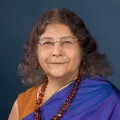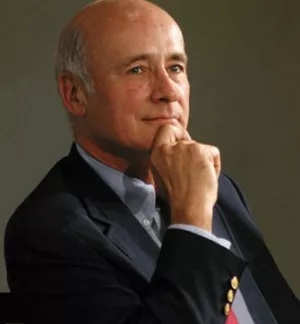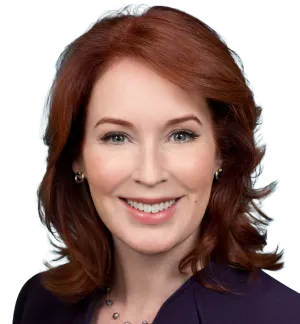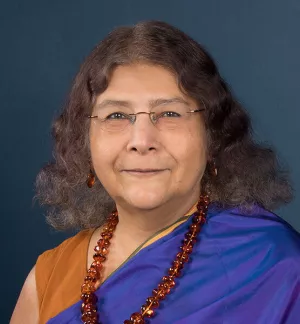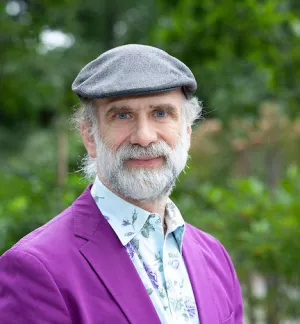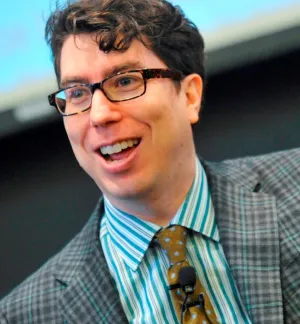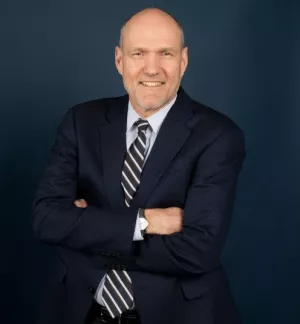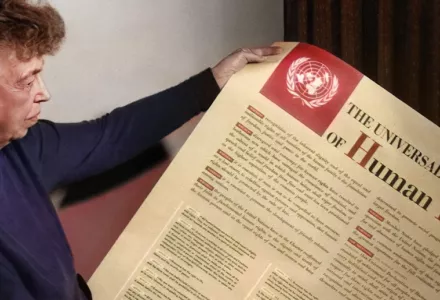
Belfer Center experts comment on how changing political systems, rapid advancement of technology, and climate change are impacting the human rights movement
In 2023, the international community celebrates the 75th anniversary of the Universal Declaration of Human Rights (UDHR). In recognition of this milestone, Belfer Center experts shared their perspectives on the evolution of the global human rights movement as part of Making a Movement: The History and Future of Human Rights, a publication of the Carr Center for Human Rights Policy.
FREDRIK LOGEVALL - Laurence D. Belfer Professor of International Affairs, Harvard Kennedy School
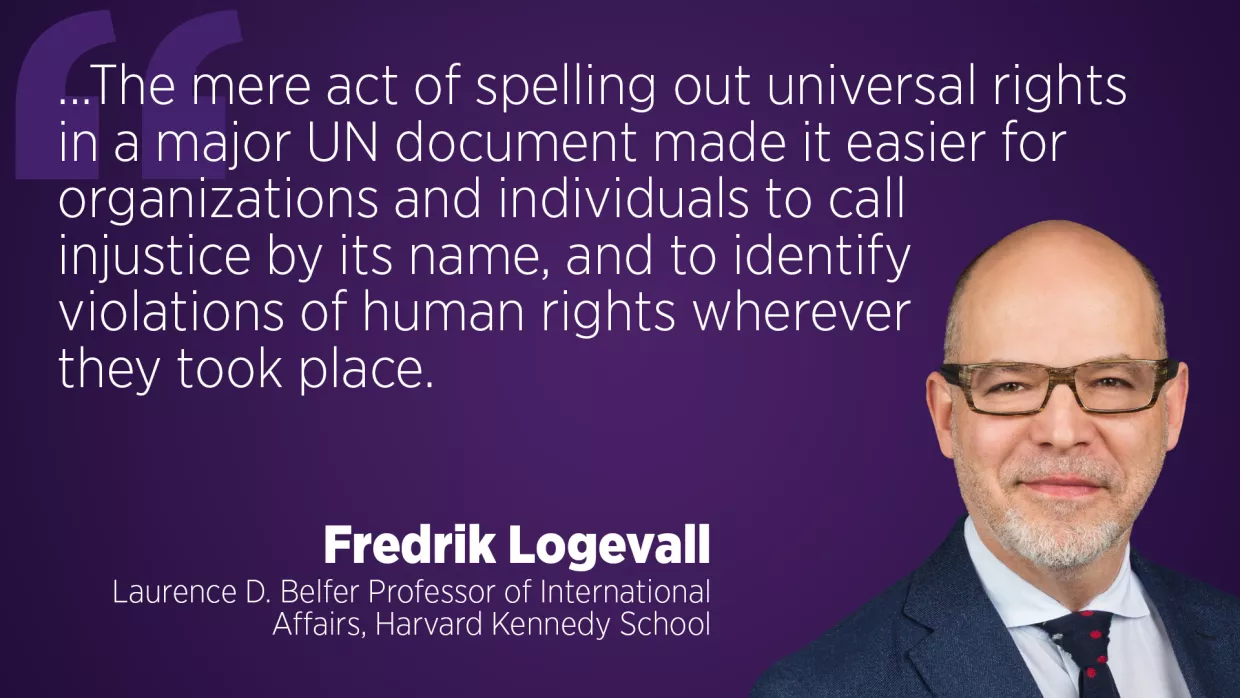
The UDHR stands as one of the most important documents in modern world history. Its effects have been profound, which is remarkable given that its limitations are plain to see. For one thing, the Declaration was not a treaty in the formal sense, and it did not create legally binding obligations.
For another, the rights it delineated were described in hazy, aspirational terms, open to varying interpretations, and national governments found it easy to sidestep those it deemed problematic. Imperial powers refused to promise independence to their colonial populations, and the United States did not commit itself to ending racial segregation. Several authoritarian states chose to abstain rather than vote for the Declaration.
Yet, from the start, the UDHR mattered enormously for the world. For the first time, humanity had a globally agreed upon document asserting that certain rights applied to all people everywhere, whatever their race, creed, religion, gender, or nationality. These rights did not need to be earned; all individuals were born with them. More concretely, the Declaration inspired and laid the foundation for a broad array of legally binding human rights treaties—more than seventy, at last count. And there was also this: the mere act of spelling out universal rights in a major UN document made it easier for organizations and individuals to call injustice by its name, and to identify violations of human rights wherever they took place.
Today we’re still a long way from realizing the goals laid out in 1948, and it’s tempting in such a situation to turn cynical, to be dismissive of all documents that emerge from the labyrinthine bureaucracy of the General Assembly. The temptation should be resisted. Not all UN declarations are created equal. Whatever its limitations, the UDHR has been essential to the advancement of rights throughout the world.
JEFFREY FRANKEL - James W. Harpel Professor of Capital Formation and Growth, Harvard Kennedy School
I do not work on human rights, and I am an outsider to academic literature. But I have views. In my view, the language of human rights is not useful for achieving reductions in global poverty. I imagine that only an economist would say such a thing.
There are four ways that I think I hear people use the word “rights”:
(1) First, as a natural law of divine providence: “I know that group X has a right to Y, because God told me so.” Discussion in this case is probably not useful.
(2) “There has been an agreement that people have a right to Y.” If anyone thinks they have been denied the right, they can appeal to some institution—it need not necessarily be written down. I like this second definition the best, even if human rights specialists disagree.
(3) “I propose that Y be made a right.” It is useful to distinguish between a right that has been agreed upon and a proposal that it should be agreed upon. But I won’t be pedantic about this distinction.
(4) “I think goal Y is really, really important.” This is often what people truly mean.
I can’t emphasize strongly enough that I think reducing poverty around the world is the most important economic objective of our time. It should be a top priority. But that doesn’t mean that designating the elimination of poverty as a right is useful. It is an imprecise use of language, to begin with. Moreover, I don’t think it is expedient, and it could even be counterproductive.
Consider now four cases to illustrate the distinction between how important a goal is and whether it is appropriate to use the language of rights:
(1) Something that is truly important and where the language of rights is appropriate. Example: Freedom from torture.
(2) Something that is important, but where calling it a right doesn’t really fit. Example: Safety from auto accidents.
(3) Something that is not important, but where the language of rights is appropriate. In the game of Monopoly, if you pass “Go,” you are entitled to $200. If this right is violated, you can point to the rules on the box and appeal to the other players.
(4) Something that is not important, and where the language of rights is not relevant. I would like to win a Monopoly game. But winning isn’t a right.
What is the harm in saying everyone has the right to be free of poverty? Why do I say it can actually be counterproductive? One point is that applying rights language too broadly can undermine the credibility of other important rights agreements, such as the provisions in the Universal Declaration of Human Rights, of which we observe the 75th birthday this year.
But the point I wish to emphasize stays inside the sphere of economics: applying rights language to poverty reduction sends the wrong signals to countries as to the most important things they can do to make economic progress.
Three historical examples. First, in the aftermath of decolonization in the 1960s, and as an outgrowth of so-called dependency theory, developing countries demanded a new international economic order. The United Nations General Assembly formally adopted the concept in 1974 and adopted a “Declaration on the Right to Development” in 1986. Developing countries wanted “technology transfer,” financial transfers, and “just and equitable” determination of commodity prices. These nebulous wishes were never going to be realized. In the meantime, they diverted the countries’ attention from what they needed to do to raise the standard of living of successive generations of their citizens: macroeconomic stability, rule of law, and the other best practices that we teach about here at the Kennedy School.
Next, in 1990, Germany reunified. At the time, productivity in East Germany was only 1/3 of what it was in the West. But the government adopted the principle that Easterners were entitled to the same standard of living as Westerners. Specifically, Chancellor Helmut Kohl decided that East German marks were to be converted into West German marks at an unrealistic parity of one-for-one and then pushed for East German workers to get the same wages as West Germans. As an implication, with East German workers 1/3 as productive as their counterparts, unit labor costs started out 3 times higher in the New Lander. The high costs discouraged private investment in the East. This slowed subsequent economic growth there and may help explain why, 30 years after unification, productivity in every eastern state remains lower than productivity in every western state (0.75, on average) and why unemployment remains consistently higher.
A final example. In India in 2005, a new law guaranteed every rural household 100 days of employment each year. Economists have judged this program an inefficient way of shifting income to the poor.
Rights can be wishful thinking.
JASON FURMAN - Aetna Professor of the Practice of Economic Policy, Harvard Kennedy School
Since the Universal Declaration of Human Rights was adopted, there has been enormous progress in reducing extreme poverty and in people’s access to better health, well-being, and economic security. In 1948, more than half of the global population lived in extreme poverty; today it is about one-tenth.
Global life expectancy has risen from less than 50 years to more than 70 years—with much less inequality in life expectancies between countries than was the case 75 years ago. Global inequality—the inequality between people all over the world without regard to national boundaries—is considerably lower today than it was in 1948. This has happened less because of reduction in inequality within countries—in fact, inequality within countries is generally higher today than it was in 1948.
Instead, it has happened because of a reduction in inequality between countries—particularly, but not entirely, due to the fact that growth has been faster in poorer economies like China and India than in richer ones like the United States and the European Union.
The progress is still incomplete as large parts of the world, most importantly Sub-Saharan Africa, have been left out of much of it. And “extreme poverty” itself is a very limited benchmark—about $2 per day per person—that falls well below what is needed for a dignified economic life in just about any country in the world. Moreover, in some countries—especially many advanced economies—progress has slowed dramatically as the increase in inequality has offset any of the benefits of what has been a relatively slow overall pace of growth.
Further progress will require stronger growth and greater economic inclusion, with the ratio of the importance of these two depending on the situation. A country that is growing at 10 percent a year, like both China and India have done in the recent past, can still have a big increase in inequality while doing much better in providing housing and food for its citizens. For the poorest countries in the world, trying to achieve these sorts of growth rates is essential. Economists have increasingly emphasized the many ways in which rule of law, respect for rights—including human rights and property rights—and openness to disruption, rather than permanent control by the political ruling class, are all essential for economic growth.
Higher-income countries could not do anything to raise their growth rates to 10 percent annually and, in many cases, it is hard to imagine them being able to grow even at 2 percent annually. For these countries, reducing inequality is the biggest lever they have to expand opportunity, dignity, and access to food and housing.
JOSEPH S. NYE, JR. - University Distinguished Service Professor and Dean Emeritus, Harvard Kennedy School
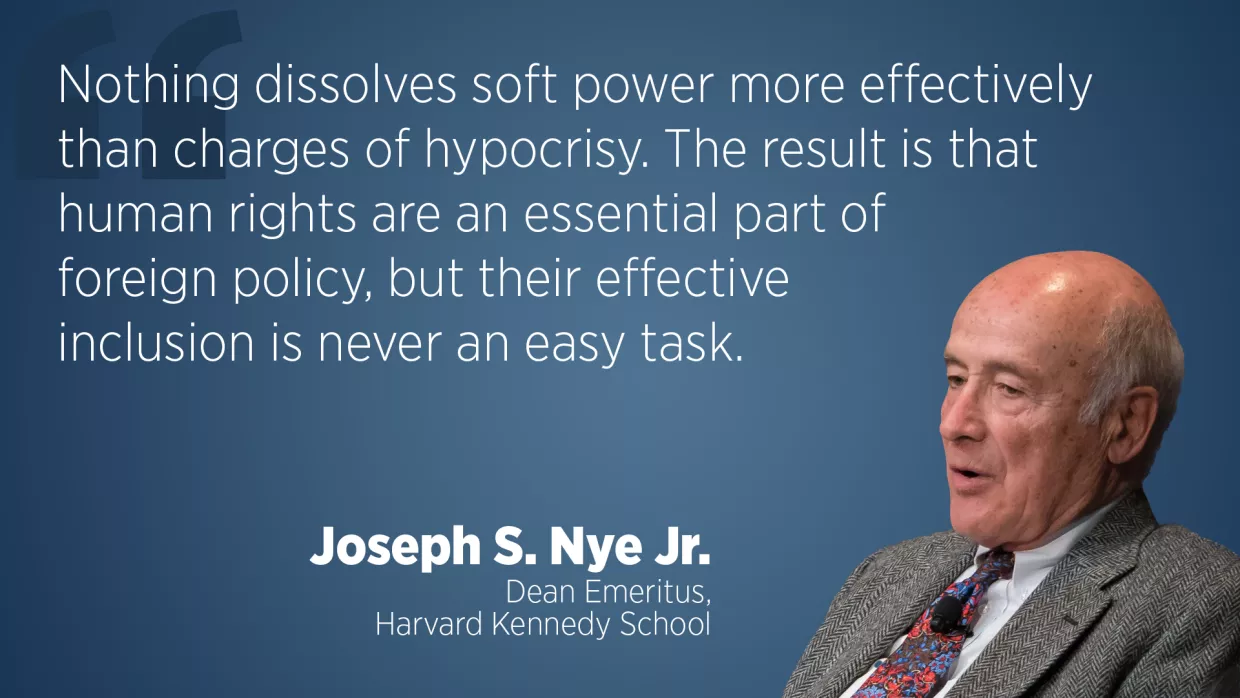
Realists sometimes complain that human rights interfere with American power in the harsh world of international relations. However, a sophisticated realist understands that, in addition to hard military and economic power, the soft power of attraction is also important. And human rights not only define us as a people, but they can also enhance our soft power.
Survival and security are not the only important aspects of world politics. Polls show a majority of Americans also want the United States to pursue altruistic, humanitarian aims internationally. Many Americans have a general sense of a human community and support a foreign policy based, not just on international legal obligations, but upon moral considerations. While foreign aid in general is not popular, public support for international economic and public health assistance was strong enough for presidents to consistently maintain such policies. For example, George W. Bush’s initiatives related to AIDS and malaria in Africa stand out as moral policies which enjoyed such support. The extent of Good Samaritanism may be limited, but contrary to the skeptics’ views, helping others is one of the foreign policy objectives for which American presidents have found public support.
There is more contention when verbal or economic support for human rights, or curtailment of military sales to a country such as Saudi Arabia, offends authoritarian leaders and obstructs other aspects of American foreign policy. Such disputes over values are normal and to be expected in a democracy. Americans have a degree of cosmopolitan concern about human rights in China or Myanmar, but human rights and democracy promotion cannot be the sole focus, as Jimmy Carter discovered. Foreign policy involves trade-offs among many objectives, including liberal values. Otherwise, we would have a human rights policy instead of a foreign policy.
Trade-offs among priorities and objectives are at the heart of an effective foreign policy, and this creates problems not only for our human rights values but also for our soft power. Nothing dissolves soft power more effectively than charges of hypocrisy. The result is that human rights are an essential part of foreign policy, but their effective inclusion is never an easy task.
RANA MITTER - S. T. Lee Professor of U.S.-Asia Relations, Harvard Kennedy School
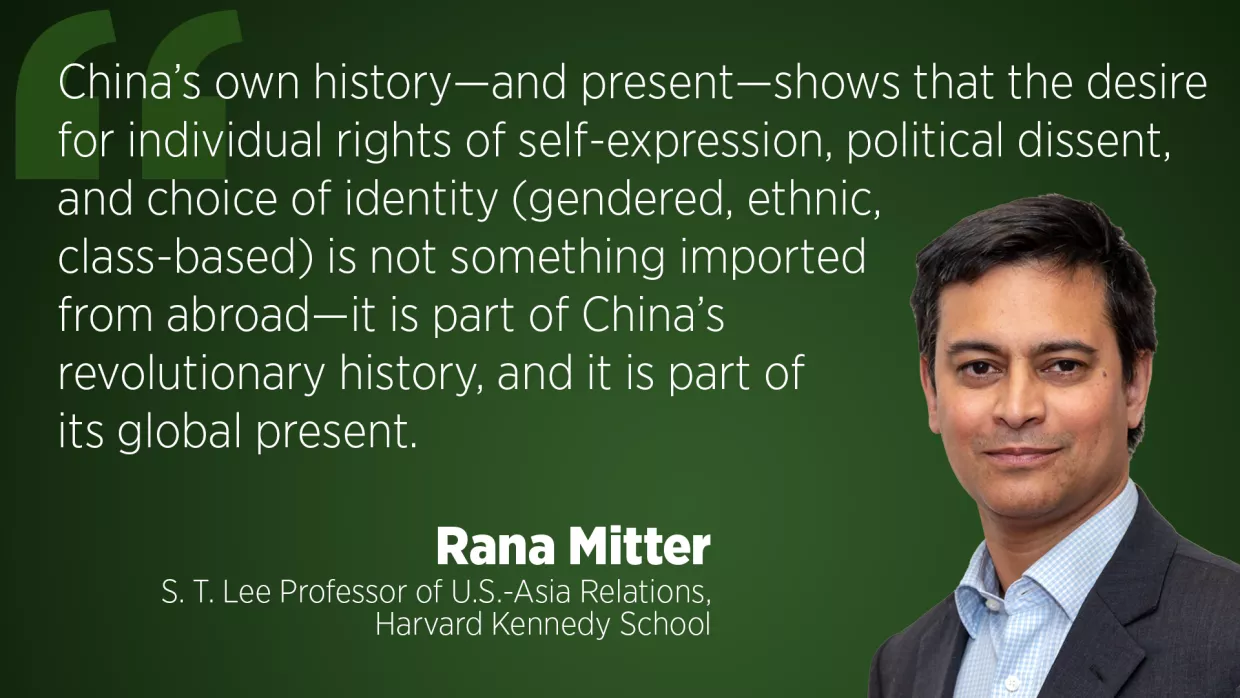
One of the most notable effects of greater Chinese involvement in international organizations, such as the United Nations, is a shift in the definitions of human rights. China’s leaders have been keen to argue that economic wellbeing is the “first human right,” and individual civil liberties are, by implication, secondary to this. Greater wellbeing is, of course, essential for human flourishing. But the current Chinese position doesn’t reflect its own history.
When P.C. Chang, one of China’s most important modern philosophers, was part of the process that produced the 1948 Universal Declaration of Human Rights, he was quite clear that the Confucian tradition included concern for the individual’s rights, not just those of wider society (after all, part of that tradition is about self-cultivation of the individual to become a better, more moral person). The Communist Party itself debated these issues over the twentieth century, with the feminist writer Ding Ling making a powerful case in the 1940s that women’s rights could not be regarded simply as a subset of class-based rights. Mao silenced her eventually, but that did not make her point any less important—and her successors are behind phenomena such as the online feminist assertion of rights in the 21st century (such as the “rice rabbit” online movement of 2018—that phrase is pronounced Mi Tu or “me too” in Chinese).
Of course, China’s governmental position on economic rights is worth listening to, because of the country’s success in reducing poverty since the 1970s. But China’s own history—and present—shows that the desire for individual rights of self-expression, political dissent, and choice of identity (gendered, ethnic, class-based) is not something imported from abroad—it is part of China’s revolutionary history, and it is part of its global present.
MEGHAN O'SULLIVAN - Director, Belfer Center for Science and International Affairs; Jeane Kirkpatrick Professor of the Practice of International Affairs, Harvard Kennedy School
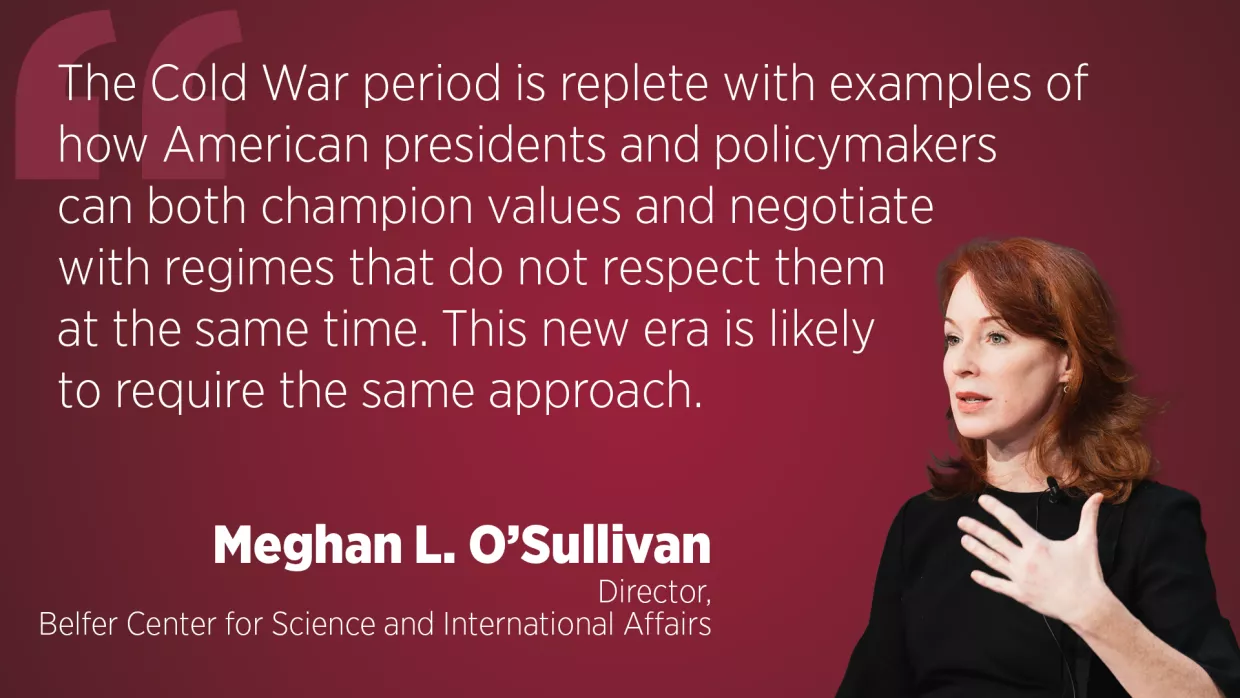
This is an opportune moment to reflect on the relationship between human rights and American foreign policy. Not only is it the 75th anniversary of the Universal Declaration of Human Rights, but the world is also moving into a new geopolitical landscape. After thirty years marked by broad cooperation between powers and progressive economic integration, the world now faces much greater fragmentation and geopolitical uncertainty.
The conversations of the last decade about how to shore up the liberal international order have given way to a sense that that order is less likely to be repaired than it is to be supplanted by something yet to be defined. At this time of shifting power, many are eager, or at least willing, to jettison some of the institutions and architecture that have defined the global arena since 1948.
The Universal Declaration of Human Rights, fortunately, has weathered this shift from a largely cooperative international environment to a more deeply competitive one, where the risks of great power conflict are real. But it is reasonable to ask what role human rights and dignities play in an era dominated by intense competition between the United States and China. Realists may argue that human rights and values need to take a back seat in American foreign policy in order to ensure that the United States is able to secure its interests in these prickly times.
Yet, in practice, it would be a mistake to downgrade the importance of human rights and other such values at this time, for many reasons. For example, the building of broad coalitions will be central to America’s ability to counter China in areas where its influence is seen as inimical to its interests. Countries will not be motivated to join and sustain such coalitions if they perceive the purpose is solely to shore up American power. Instead, they will be moved to protect and advance a system underpinned by certain norms and values of which the protection of human rights has been essential.
Maintaining the protection of human rights as central to American foreign policy in an era of great power competition does not mean that U.S. policy cannot be supple enough to meet the complex challenges of the time. The Cold War period is replete with examples of how American presidents and policymakers can both champion values and negotiate with regimes that do not respect them at the same time. This new era is likely to require the same approach.
SHEILA JASANOFF - Pforzheimer Professor of Science and Technology Studies, Harvard Kennedy School
![...How can we ensure that expanding the frontiers of knowledge and toolmaking will emancipate rather than hurt or enslave humanity? [Science and Technology Studies] embraces the notion that knowledge and technologies which are good for humanity should protect the fundamental pillars of the Universal Declaration of Human Rights (UDHR) - dignity, liberty, equality, and brotherhood - not diminish or compromise them. Sheila Jasanoff, Pforzheimer Professor of Science Technology Studies, Harvard Kennedy School](/sites/default/files/styles/1240xy/pantheon-files-migration/2023-12/Social%20Quote_Jasanoff_Human%20Rights.png.webp?itok=TxVlsLhr)
The relationship between science, technology, and human rights is embedded in the oldest myths of Western civilizations, from Adam and Eve’s expulsion from Eden because they ate the forbidden fruit of knowledge to Prometheus’ fateful decision to bring fire to humankind.
Implicit in these stories is a paradox that lies at the heart of moral inquiry in the field of Science and Technology Studies (STS): how can we ensure that expanding the frontiers of knowledge and toolmaking will emancipate rather than hurt or enslave humanity? STS embraces the notion that knowledge and technologies which are good for humanity should protect the fundamental pillars of the Universal Declaration of Human Rights (UDHR)—dignity, liberty, equality, and brotherhood—not diminish or compromise them.
One strand of concern in the field of STS, therefore, centers on points in the development of science and technology where potentially harmful consequences get embedded into the very facts and designs that emerge from making and applying knowledge. These can be extraordinarily diverse. The causes of rights-endangering development that reduce equality or damage brotherhood can range from deliberate acts to carelessness or institutional blindness. For example, promoting crop biotechnology based on scientific demonstrations of safety may seem justified from the standpoint of feeding the world population or fighting climate change. Yet, the failure to consider the impacts of a technology that favors industrial-scale agriculture at the expense of small farmers may have disproportionate effects on people’s economic rights, as well as their right to a safe and healthful environment. Through ideas such as “responsible research and innovation” or “upstream risk assessment,” STS seeks to identify the reasons for designers’ possible narrowing of vision, and thereby to build a wider concern for human rights into the early stages of technology development.
STS, however, is also concerned with problematic shifts that may occur when developments in science and technology impinge on the qualities that make us human. In this respect, the field tracks the UDHR’s focus on dignity and liberty. Will the expansion of research on lab-created embryos or the generation of machines that displace human interaction reduce our respect for human dignity and the freedom to develop our personalities through our own choices? These concerns draw STS into exploring the theoretical foundations that justify the rights protected by the Declaration—as an adjunct to more conventional traditions in moral and political theory.
Last but not least, STS is concerned with the future, as both science and technology operate in human lives to articulate and empower destinies not within the reach of our predecessors. As long as inequality remains a stubborn foundation of our social world, the capacity to imagine and confect alternative futures is not equally distributed around the world. To give voice to human aspiration—an urge that surely animates the UDHR—one should note explicitly, as STS does, that the right to anticipate good futures is itself an ethical obligation that we owe to one another as members of the species that we call “human.”
BRUCE SCHNEIER - Adjunct Lecturer in Public Policy, Harvard Kennedy School
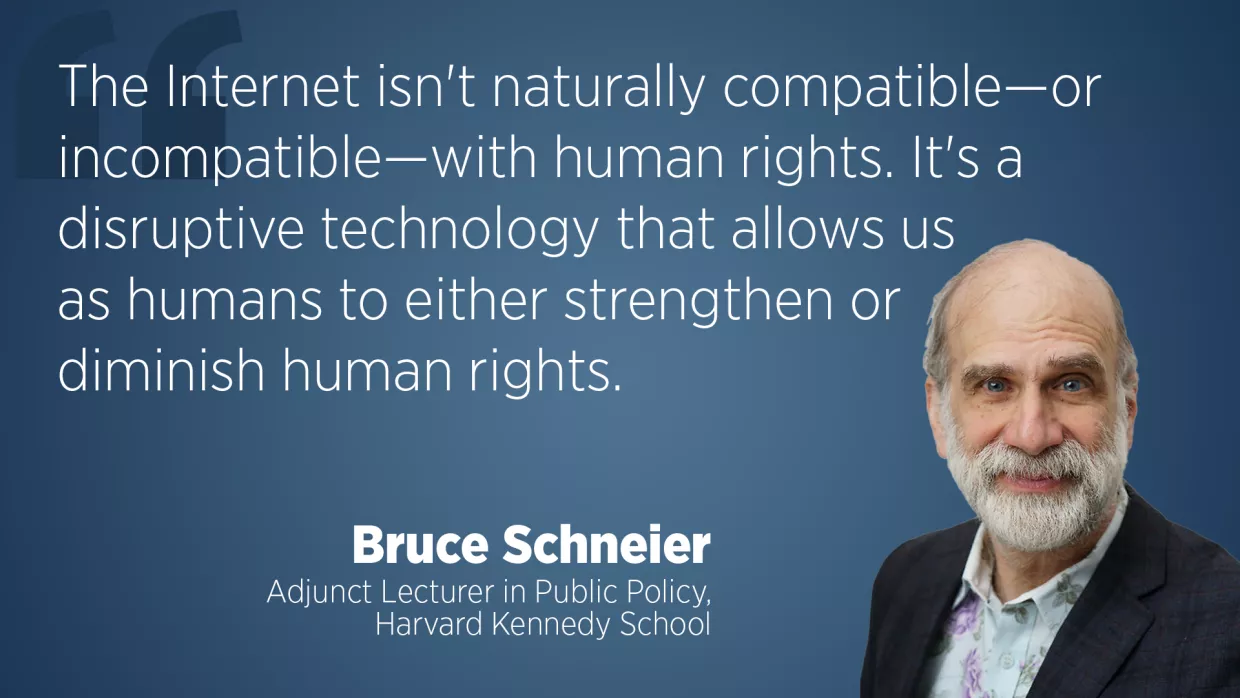
Technology doesn't change people, but it changes affordances. Things become easier or harder, cheaper or more expensive, either individually or at scale. This is how I think about human rights in the Internet age. We can imagine many ways in which the Internet can affect human rights, but the two specifics that my work consistently returns to are privacy and free expression.
Computers naturally collect data about their actions, which is data about the people using those computers. As data storage and processing have become cheaper, more of this data is saved and used. This is all surveillance data, and the level of wholesale broad surveillance possible today is simply staggering—just think about how much your smartphone knows about your behavior. Protecting human rights in this environment requires deliberate actions by governments, actions that go against the surveillance capitalism business model of the Internet.
Modern computer networks are easy to censor, either individually or en masse. We're living in a world where tech platforms have unprecedented power to silence individuals and groups or permit hate and dangerous speech that results in the silencing of individuals and groups. This can be targeted to specific individuals, or as broad as government-mandated Internet shutdowns in a large geographic area.
Protecting human rights means ensuring unfettered access to the Internet, both to send and to receive. It means access to true information, free from propaganda and disinformation. It also means personal safety that allows for free expression.
This year's most striking technological advances are in the area of artificial intelligence. And once again, affordances are changing. Surveillance has long been easy, but eavesdropping on actual human conversations was still difficult. AI's ability to understand and summarize will change that. AI will make disinformation more effective, and censorship easier and more effective (again, because of AI's ability to understand beyond individual words). These technologies will largely reside in the hands of powerful corporations and governments—many of whom do not have human rights as a priority.
The Internet isn't naturally compatible—or incompatible—with human rights. It's a disruptive technology that allows us as humans to either strengthen or diminish human rights. We can be deliberate as we build it, choosing implementations that strengthen human rights. Or we can ignore human rights as we build these technologies, allowing those who either don't care or are actively hostile to human rights to prevail. My work has long been to advocate for the former.
JONATHAN ZITTRAIN - George Bemis Professor of International Law, Harvard Law School; Professor of Public Policy, Harvard Kennedy School; Professor of Computer Science, Harvard School of Engineering and Applied Sciences
The public/private divide complicates bringing a human rights framework to bear on new technology.
Traditionally, our human rights are construed to limit the activities of public authorities—in particular, to limit their use of legal coercion and, if escalated, force.
But the last thirty years of digital technology's expansion has happened in a particularly privatized way: "regular" companies have built and continually adjusted the scaffolds of our speech, our relationships, and our commerce. Figuring out when governments—to advance human rights—can and should push companies to shape their services differently, especially when the common balancing tests around speech give muddy results among multiple contesting individuals, is a difficult yet worthy problem.
The 2011 UN Guiding Principles on Business and Human Rights represented a welcome new layer of thinking around firms' responsibilities here. But filling in the blanks is enormously difficult, especially when, say, social media platforms or makers and deployers of AI Large Language Models could undertake any number of actions (or inactions) that affect how people form beliefs about the world or enter into conflict with one another.
What might be more promising are entirely new institutions and institutional relationships, not directly grounded in national authorities or international governance bodies, to better reinforce notions of dignity and thriving that underpin the aspirations of a universal human rights regime. Mapping and testing out what those institutions and relationships could look like is the core of my current work.
LINDA BILMES - Daniel Patrick Moynihan Senior Lecturer in Public Policy, Harvard Kennedy School; US Member, UN Committee of Experts on Public Administration (CEPA)
Dag Hammarskjöld famously said that the United Nations “was not created to take mankind to heaven, but to save humanity from hell.” I reflect on this often in my role as the United States’ member of the United Nations Committee of Experts on Public Administration (CEPA).
There are 24 countries in this body, and we advise the UN on ways to advance and to remove institutional barriers to implementing the 17 Sustainable Development Goals (SDGs).
The SDGs are a set of goals, metrics, and indicators that the 193 UN member countries adopted in 2015 and hope to achieve by 2030. They intertwine with the earlier Universal Declaration of Human Rights, which provides a normative framework that underpins the values and principles embedded in the SDGs. Many of the SDGs are connected directly to human rights, including Goal 1 (No Poverty), Goal 2 (Zero Hunger), Goal 3 (Good Health and Well-being), Goal 4 (Quality Education), Goal 5 (Gender Equality), Goal 10 (Reduced Inequality), and Goal 16 (Peace, Justice, and Strong Institutions). The other SDGs are related to critical components of these, such as clean water and the environment. Together with my colleagues on the CEPA, I am focused on the implementation of the SDGs. For example, I work on developing tools to measure the budgetary resources allocated to women in society (Goal 5) and on developing tools for measuring natural capital and adapting economic statistics to incorporate ecosystem services. I also work on broadening the use of concessionary finance for climate adaptation, which is related to Goal 13 (Climate Action), Goal 14 (Life below Water), and Goal 15 (Life on Land). The system is far from perfect and the UN itself can be a challenging environment with many competing priorities. But whatever the specific topic, the guiding light and inspiration is always based on the principles laid out by UDHR, and the belief that there is a set of fundamental human rights that people are not only entitled to have, but need to have as a precondition for achieving the basic goals that the UN has embraced.
HENRY LEE - Director, Environmental and Natural Resources Program, Belfer Center for Science and International Affairs; Senior Lecturer in Public Policy, Harvard Kennedy School
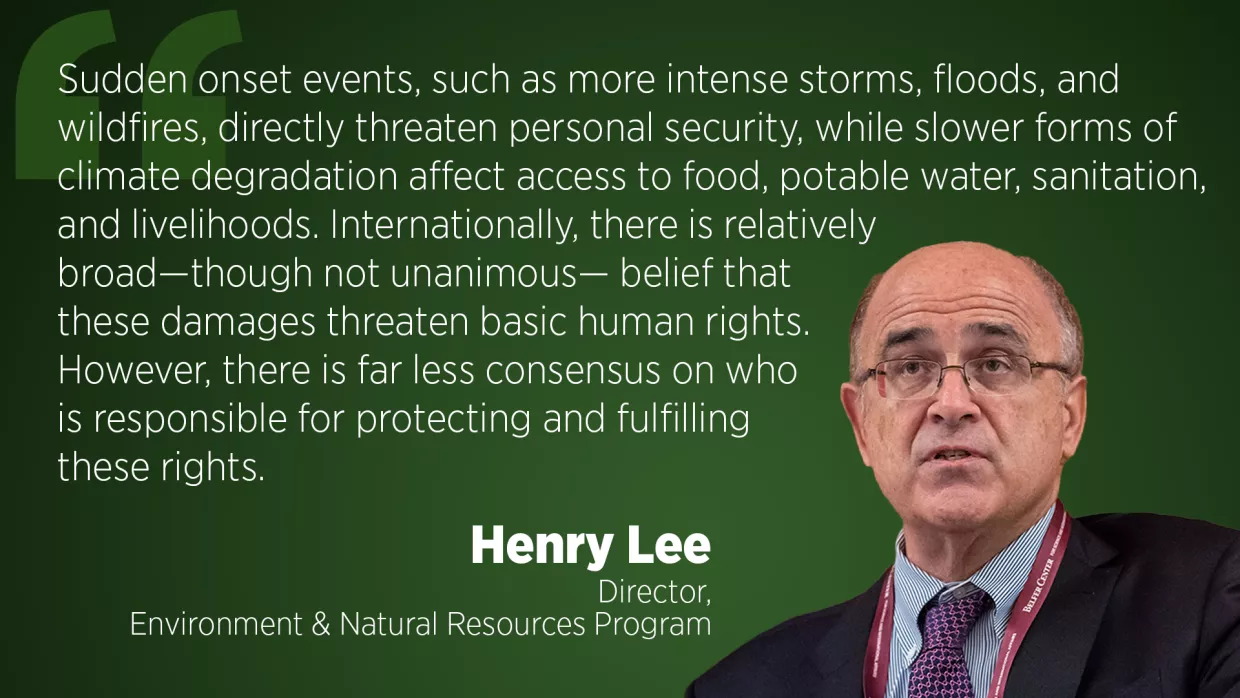
The United Nations has repeatedly stated that climate change has clear and immediate implications for human rights. Certainly, its impacts affect the lives and well-being of people around the world.
Sudden onset events, such as more intense storms, floods, and wildfires, directly threaten personal security, while slower forms of climate degradation affect access to food, potable water, sanitation, and livelihoods. Internationally, there is relatively broad—though not unanimous— belief that these damages threaten basic human rights. However, there is far less consensus on who is responsible for protecting and fulfilling these rights.
While governments in richer countries have the financial ability to move funds and protect the more vulnerable segments of their population, such is not the case in Bangladesh, Somalia, or Vanuatu. If we accept that all people deserve to be protected from climate-induced disasters, do the developed countries that historically contributed the most to the greenhouse gas concentrations have a moral obligation to protect the lives and well-being of populations vulnerable to the damages of climate change in the poorer regions of the world?
Consider the floods that devastated Pakistan in 2022. That summer, Pakistan received 190 percent of its average rainfall in July and August, resulting in floods that submerged onethird of the entire country. A World Weather Attribution study found that climate change likely contributed to the extreme monsoonal rainfall. The deluge killed 1,700 people, displaced 8 million people from their homes, and destroyed huge swathes of agricultural land and infrastructure. Reconstruction will take years and cost over $16.3 billion, according to a Post-Disaster Needs Assessment conducted by the Government of Pakistan with support from the Asian Development Bank, the EU, the UN Development Programme, and the World Bank.
There is broad agreement that it is not reasonable to expect Pakistan, or other poor countries, to shoulder the costs of climate adaptation and damage by themselves. What should be the obligation of the developed countries? In past international forums, they have committed billions of dollars to this cause, but these commitments have not always been honored. Further, the costs ten years hence will be much higher. The domestic politics within these wealthier nations makes it all but impossible for them to accept that their taxpayers have any liability for climate induced damages in Pakistan or any other developing country.
These questions are fraught with moral hazard implications, and disagreement over how to answer them seems to have stalemated the implementation of the Loss and Damage Fund established at COP27 in 2022. But as the damages from climate impacts mount, and the threat to a portfolio of human rights grows more acute, it is critical that the international community reach some sort of compromise.
FRAN ULMER - Senior Fellow, Arctic Initiative, Belfer Center for Science and International Affairs
The accelerating rate of climate change in the Arctic has been well documented by dozens of scientific research projects and papers that have described in some detail how changes are already impacting people.
For Arctic Indigenous people, the dramatic changes in the north have profound health, safety, cultural, and food security ramifications. For example, the Inuit people rely to a large degree on the harvest of natural resources (fish, birds, berries, and marine and terrestrial mammals) for food and cultural practices. Animal species’ health and range distributions have been altered by less sea ice, earlier spring and later winter conditions, altered migration patterns, etc., which means less certainty and availability for Inuit harvesting.
Additionally, permafrost, which underlies much of the Arctic region, is thawing, creating unstable landscapes, causing collapsing buildings and eroding coastlines, which have combined with other changes, like increased flooding, to make some villages no longer safe places to live. As a result, over two dozen Alaska villages have been identified by the U.S. Army Corps of Engineers as potentially hazardous, and several have already begun to move. The rights of Indigenous people, like the Inuit, are being impacted already, and if current trends continue, the damage will only become more dramatic.
STEPHEN WALT - Robert and Renee Belfer Professor of International Affairs, Harvard Kennedy School
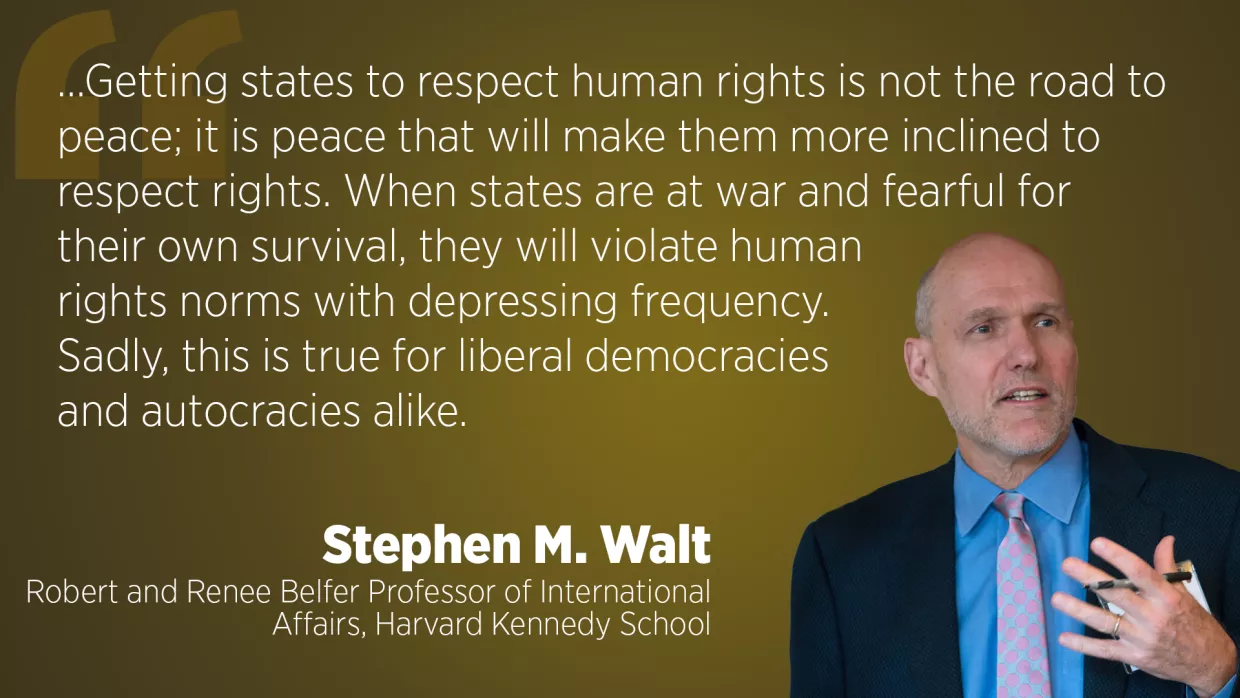
Conceived and written in the shadow of a horrendous conflict, the Universal Declaration of Human Rights (1948) is a monument to humanity's efforts to limit the tyranny of the strong over the weak and defenseless. That its ideals have yet to be fully realized should not lead us to disparage the hopes that inspired it and the efforts of its defenders.
Yet, one must still ask: why has humanity failed to live up to the Declaration's lofty principles? For starters, the Declaration extols the rights of individual human beings and makes no distinction among them. But human beings are not atomized individuals; we are social animals with a powerful tendency to privilege our own group over others. A declaration proclaiming universal rights is thus in some tension with each nation's tendency to put its own citizens and interests ahead of others'. Moreover, these same principles can also be used to justify ambitious crusades against any government that fails to respect them.
Furthermore, security is often precarious in a world where no agency or institution exists to protect states from each other. Governments of every kind will ignore well-intentioned declarations and well-established norms if they believe that adhering to them might leave them vulnerable.
It follows that getting states to respect human rights is not the road to peace; it is peace that will make them more inclined to respect rights. When states are at war and fearful for their own survival, they will violate human rights norms with depressing frequency. Sadly, this is true for liberal democracies and autocracies alike. When states are not at war but still feel threatened by foreign rivals, they are more likely to crack down on dissenters, spy on their own citizens, torture perceived foes, and infringe on other liberties, justifying all of these actions as regrettable necessities.
Accordingly, the best way to make the ideals of the Universal Declaration a reality is to do more to build a peaceful world.







